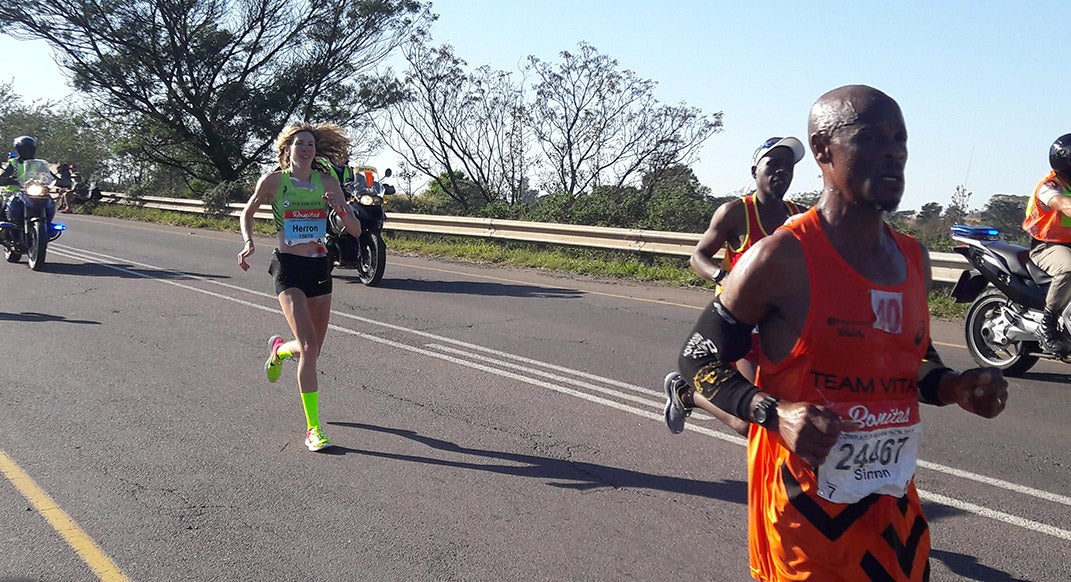After Winning Comrades, Camille Herron Focuses on Western States

On June 3, 2017, Camille Herron won South Africa’s Comrades Marathon—an 87-kilometer race on the country’s east coast between the towns of Durban and Pietermaritzburg—the first American woman to do so since Ann Trason in 1997. Herron, 35, of Oklahoma City, Oklahoma, is a relative newcomer to the trail scene. But her running resume is extensive, including 20 career marathon wins and three Olympic Trials marathon qualifiers.
Her transition to trail running last year, she says, was a logical return to what had made her fall in love with running in the first place: cross country. “Trail running merges my love for natural terrain with my natural talent to run long and fast,” she says.
Her first ultra, a road 100K in 2015, was the 100K National Championships at the Mad City 100K in Madison, Wisconsin, which she won. Her first trail ultra, in 2016, was California’s uber-competitive Lake Sonoma 50, where she finished fourth female. In the last two years, Herron has logged wins at Washington’s White River 50, Virginia’s Ultra Race of Champions 100K and Tarawera 102K in New Zealand.
Her performance at Comrades was just the first of a two-part mission to become the first woman since Ann Trason to win both Comrades and Western States in the same year. A “nagging hamstring” injury has proved challenging, but, Herron says, “I feel very confident that I can pull off the Comrades-Western States double win.”
Trail Runner caught up with Herron to learn about her training and strategy for Comrades, race prep for Western and why she drinks beer during races.
What was your strategy for Comrades, and did things play out as planned?
I train by heart rate, to learn the right effort [to pace myself during a race]. For Comrades and Western States, that is between 75 and 80 percent of my maximum heart rate. I focus within myself on this effort. I was at 80 percent [of my peak] fitness, which I knew would be good enough to contend for the win [at Comrades].
How have you been training for your Comrades-Westerns double?
I have been averaging over 100 miles per week for more than 10 years, on a variety of surfaces, speeds and terrain. This has given me the mental and physical strength to push through and transcend when things get hard [in a race]. I run twice a day every day, unless I’m tired. I listen to my body and rest when it needs to, especially after races, and then build back up.
What was your nutrition strategy for Comrades, and how will that change for Westerns?
I’ve really dialed in my fueling and hydration, and [gotten better at] improvising or troubleshooting quickly. I fuel mostly with gels, water, sports drink and soda. Your gut can process a maximum of 60 to 95 grams of glucose and fructose per hour, so I aim for that amount.
I also like to drink a beer or two during races, specifically Rogue Dead Guy Ale. I figured this out by accident at the Ultra Race of Champions 100K [in 2016]. It seems to balance me out mentally and physically, and it makes me feel good! It’s a nice treat to look forward to. But my limit is two beers [per race].
What will you be doing now between Comrades and Westerns?
Recovering. In ultras the endocrine system takes a greater hit [than in sub-ultra racing]. I think of body recovery in terms of blood flow, growth factors and nutrients. The body likes to move frequently, eat, hydrate and sleep, so I’ll be doing the little things, like getting massages and using my Rapid Reboot compression boots.
I have a Masters [in Exercise and Sport Science] and I did my thesis on enhancing musculoskeletal recovery, which has proved helpful in my career running back to back marathons [and now with ultras, too].
Do you now prefer trails to road, and, if so, why?
They are both awesome in their own ways. Road racing is much harder in terms of intensity and depletion. It’s also far more competitive. You have to have speed talent to be competitive on the roads. However, I like the beauty of trail running and the challenges of the technical terrain and logistics. The recovery is a lot quicker, too.
What is your proudest achievement as a runner?
June 24th [the day of the 2017 Western States 100] is when I achieve my proudest achievement.